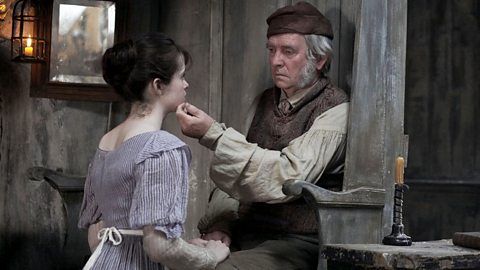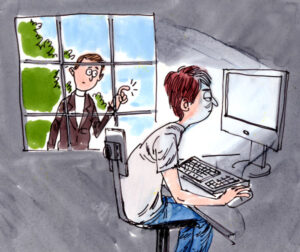
Claire Foy and Tom Courtenay, as Little Dorrit and Old Dorrit in a BBC adaptation of Dickens’s classic novel.
Little Dorrit, one of Dickens’s late and truly great novels, centres on the theme of captivity. Drawing as it did on the author’s own childhood experience of the Marshalsea prison for debtors (where his own father had spent time) it tells the story of the Dorrit family.
Briefly, Old Dorrit has been locked up in the Marshalsea for so long that he has become – at least in his own eyes – a worthy object of veneration. He deals with the shame of his indebtedness by playing the role of monarch of the prison. He affects the belief that visitors will feel privileged to pay tribute in small gifts of money for his upkeep. He converses with these as though bestowing honour on respectful envoys from foreign lands.
His daughter Amy, Little Dorrit, was born in and has grown up in the Marshalsea – and is stunned when an investigation reveals that, to a vast fortune trapped in legal confusion in the world outside, her own father, Old Dorrit, is the true heir.
Released from the Marshalsea in splendour, the family undertakes a European Grand Tour. In Venice eventually, residing in a luxurious villa, Amy is troubled to observe that:
“A perfect fury for making acquaintances on whom to impress their riches and importance has seized the House of Dorrit… It appeared on the whole, to Little Dorrit herself, that this same society in which they now lived greatly resembled a superior sort of Marshalsea.”
In just these two sentences Dickens reveals that Old Dorrit’s real prison had not been the Marshalsea, or even London. It was portable. He had carried it with him from London to Venice, in his own head. It was the prison of his own fixed conviction that his dignity and value were absolutely at the mercy of the judgement of others.
So profoundly insightful is this, into the nature of human self-imprisonment – and into the current global plague of digital attention-seeking – that Little Dorrit should be on the curriculum of every second-level school and university. For with the Internet has come a perfect fury for making acquaintances on whom to impress our own grandeur – and even teenagers look to carry with them everywhere the means by which this fury can be satisfied at a moment’s notice. No longer needing to go to Venice to make new and better acquaintances, they can set up court anywhere, any time – even at the family table or under the bedclothes at 3 a.m.
Immediately here I will be refuted, no doubt: the Internet and the mobile phone also offer far greater freedom than is possible in complete isolation. We are free to learn whatever we wish, and to grow. We can escape from the narrowness of a small town or village, or even from the confinement imposed by a disability or terminal illness – to explore the world’s artistic and natural treasures.
So we can – but what is the current craze for Mindfulness about if not the realisation that over-stimulation and information-deluge are also dangerously oppressive – that we absolutely need to isolate ourselves in stillness, in a disciplined routine, to remain sane? And why is the addiction and mental disturbance of adolescents now so great a threat? The answer is surely that the Internet has intensified for us humans a serious aboriginal problem: we are congenitally uncertain of our own value, and dangerously prone to self-harm in the means we take to address this.
It is surely upon this very weakness – our need for the ‘positive regard’ of other humans, and our fear of their rejection – that the power of ‘social media’ – and of a host of predators – rests. How could fortunes be made from the creation of many thousands of false Internet identities – known as ‘bots’ – to be sold to the highest bidder – if not for the irrational global craze for ‘followers’ and ‘friends’ and ‘likes’? Many, many millions today have become convinced by the Internet that their value and destiny – the meaning of their own lives – is ‘socially mediated’.
Who is passionately opposing that belief? Is it not refuted by the Christian teaching that our value as individuals is not variable with social opinion, or any ‘media’, but both sacred and fixed with our eternal identity, by birth? Why have I yet to hear a Mass homily, or read a pastoral statement from a bishop, that will emphatically say so?
To ‘redeem’ someone was originally to buy them out of real slavery. Apparently at a loss to explain nowadays the meaning of Christian ‘redemption’, clergy seem blind to the power of Christian faith to address the tendency towards self-delusion and self-imprisonment revealed by the Internet. Too often demoralised by the power of media to reveal clerical feet of clay, our clergy in Ireland have yet to recognise the opportunity and the need that the Internet has created: to insist upon the constant, sacred and equal value of every person and to forcefully condemn the deadly scams and the trolling that social media too often foist on the most vulnerable.
No wonder that, absorbed by the small screen that promises ‘viral popularity’, teenagers so often find the church irrelevant to their lives – even while the Gospel insists that its Lord was forever rescued from the rejection of his own society by a power that transcends all human judgement.
Just when will our Irish clergy stumble over the full import, in our own time, of Jesus’s declaration in John 16: 33. “In the world you will have hardship, but be courageous: I have overcome the world.” Why is it so difficult to see that the wholly unreliable judgement of ‘the world’ is now mediated to everyone, 24/7, by the ‘Net?



Well the internet started as a military tool and then became a communication medium and now has reached its pinnacle and plays an important economic role in people’s lives. Everything drifts towards that marketplace in which we live – we have become cash-cows within a system that is gaining wealth from our dependence on planned obsolescence schemes to feel “real” and “productive” and “needed” in society.
We first have to look at where we have become captive. Is it within the internet or within that greater debtor prison called society? How does one gain stillness in either of these locations? Can you shut off the internet and then be free from the debtor prison? So how does one shut off the debtor prison?
Well thankfully for the internet, those questions and a whole lot more are being answered and those answers are being put to the test in real world simulations. Internet has become Church for many – a meeting place where sane minds seek sanity from others. Where people are not judged and whose contributions are welcomed.
Freeworlder.com from your fellow countryman, Colin Turner comes to mind – a useful tool for individual or homeless shelter alike in promoting the exchange of free goods and services. Where else would we have learned about the Zeitgeist movement (transformation to a non-monetary system) if it were not for the internet. The Venus Project and Jacque Fresco could only have accomplished what they have with the internet. It is as much a meeting place for wayward spirits as it is a marketplace where people are sold their own worthiness.
So yes, community connectivity – Church as we would have it, pops up in the strangest of places. The addiction and mental disturbances of adolescents is now greater because they have become aware of their value to society – they are a member in an economy that treats them as disposable items.
Jesus overcame the world but we have not yet. We await to be redeemed from the debtor prison that enslaves us.
And thanks to Sean for another thought provoking article. It got me questioning my own children today who are still teenagers. I asked my daughter “What’s the best thing about the internet”, to which she responded “It is a world of information where you can find anything…” “The worst thing?”, I asked – she gave me the same response.
She was quick to point out that for members of the LGBTQ community, it has been a saviour of sorts – a place where people can lose the isolation of being different and reach out to other members looking for support. That would apply to any community of people who are looking for support, as I have found personally in my search for resource-based economy advocacy which connects me with like minds in Brazil, the Philippines, Spain, Australia and beyond.
She was quick to point out that isolating oneself is not always solace. Connectivity shrinks the world. Since self-expression has become an art form these days, kids are constantly seeking that online community they can affiliate with. Bullying online is rampant but at least today, exchanges can be documented whereas in my day, it was usually a he said/she said scenario that few would bear witness to. Now phones are confiscated and punishment dealt.
Just a heads up : both my son and daughter remarked that most adults think Facebook is popular among teenagers but it isn’t. According to them, kids left Facebook when adults got involved and turned it into a marketing platform – we essentially ruined it for them – you’ll find kids blogging on Tumblr or apping out on Instagram and Snapchat these days. Facebook is pretty much dead to them.
When people question as much as Sean does in this article, only good things can come out of it. Internet : Global Prison? Perhaps, but the inquisitive mind of humans will always unlock new potential. This is the way we chart our course towards brighter days – with people like Sean questioning things, I have no doubt better days are ahead.
We can’t fight the Internet nor social media which is really the target of Sean’s anger and concern, I think. We who are adults, with our self- awareness and our long experience in dealing with the ups and downs of life and who are prepared to accept responsibility for our own weakness and put our trust in the Almighty to ease our passage into the next day; who apologise for wrongs we’ve done and are able to move on hoping to learn and improve. Yes, we adults are ok. The internet is an amazing and vital tool for us but Seán rightly points out the dangers of leaving such a tool in the hands of those still growing in self confidence and awareness and the article is indeed a warning to the rest of us about those dangers to the most vulnerable.
I’d love to see what teenagers would make of the article. It would be an excellent topic for debate. Perhaps your old school in Coleraine would give you valued feedback, Sean. It seems to me that we are all discussing and debating and making judgments about these topics/ dangers when the very people we need to hear from are those young people.
There are a lot of priests – most I’d imagine- who are internet users but, let’s face it, the majority of priests are well past their youth and what we need is a dialogue between the various sections of our mass going ( or at least baptised Catholic) population. I agree with you, Sean, about the dearth of good, relevant -to -life, homilies. In one way I can see the value of permanent deacons who are married, most with families, and who maybe have a better idea of producing a homily which reflects the reality of people’s lives. We in Armagh parish are fortunate to have a very good PD from Tyrone who serves here.
We cannot get rid of the ‘net. We must learn to teach our youngsters to use it effectively, to know how to stay safe and we must raise awareness of the dangers but above all, we need to continue to find ways of equipping our young people with confidence in their uniqueness and in the absolute certainty of the total unconditional love of God for each one of them. That’s the challenge, isn’t it. Young parents need all the support they can get in meeting this challenge. It’s a tough one ok. As a grandparent I worry too and am sometimes relieved that I am not involved in regularly having to monitor access to the internet. However we grandparents can try to pass on the gifts we do have and try to mirror that unconditional love of God. Thanks for raising awareness – again- of another of life’s big challenges, Sean.
Mary,
good point,its here and its how we use it, how we educate ourselves ,young people included in its safe and effective use.Sean you have raised an important topic for us all,young and old.
I’m not ready yet to respond to Sean’s article and the responses to it.
I’ve gone into Mindfulness mode, a perfect example of the power of the internet and specifically of aci.ie.
I’ll be back soon.
Teresa Mee
Teresa Mee